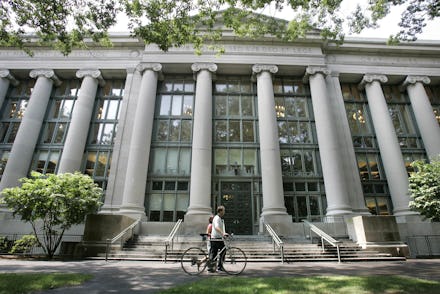Harvard Law School Is Officially Dropping Its Controversial Seal

After months of soul searching and student-led protests, Harvard Law School is ditching its official seal, which has served as a symbol of the program since 1936.
The seal — which features three bushels of wheat and the word "veritas," or "truth" in Latin — was originally the coat of arms used by the family of Isaac Royall Jr., a "wealthy Antiguan plantation owner" who helped found the school in 1817, according to Boston.com.
Read more: 15 #BlackOnCampus Tweets Describe Why College Racism Is a Nationwide Issue
This legacy has grown controversial in recent years. Like many wealthy white men in the early 19th century, Royall was a slave owner, and as student backlash against symbols of slavery swept college campuses across the United States in 2015, Harvard Law was forced to face this legacy like never before.
There were other problems as well: Another precipitating incident happened in November, when a still-unidentified person, or persons, placed strips of black tape over the portraits of black law professors in the school's Wasserstein Hall.
Law school dean Martha L. Minow appointed a committee to reconsider the Royall seal later that month. Much of the pressure to change it came from Royall Must Fall, a student-led group that, like similar efforts to change the names of buildings or statues honoring slave owners at Georgetown University and other schools, felt the crest was inappropriate.
The notion was fueled by what many had already deemed a hostile environment for black students at the university. Social media campaigns like #ITooAmHarvard drew attention to the experiences of black Harvard enrollees, many of whom said their experiences were defined by isolation, devaluation and microaggressions, according to the campaign's website.
But finally, on Monday, Harvard Law School's governing body agreed to replace the seal. They hope to have a new one designed by 2017, according to reports, but until then, students can find some satisfaction in their hard-won progress on the issue.
Not that there isn't still work to do: "This institution was founded on the backs of enslaved peoples and the racism which was created to sustain such a brutal system still infects Harvard Law School today," A.J. Clayborne, a spokesperson for Royall Must Fall, told Boston.com.
"We will not be satisfied until the law school eradicates this racism fully."